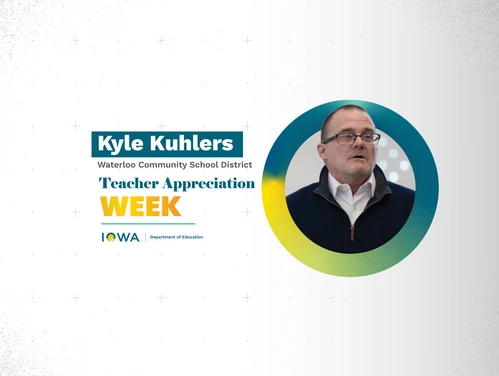Editor’s note: As part of our celebration of National Teacher Appreciation Week, we are highlighting a few outstanding educators from classrooms across the state. We thank all of our extraordinary teachers for providing students what they need to meet high expectations and realize their incredible potential.
Today’s Q&A spotlight features Kyle Kuhlers. Kuhlers has been an educator for 21 years with experience teaching Information Technology, Programming and Cybersecurity. Currently, he teaches grades 9-12 at the Waterloo Career Center in the Waterloo Community School District, where he is passionate about creating a supportive classroom culture and building strong relationships with students. For Teacher Appreciation Week, Kuhlers shared his keys for student success and why it’s important to continue learning as a teacher.
What is your favorite memory or teaching moment in the classroom?
My favorite memory in teaching is Tony. Tony didn’t pass any classes his freshman year. First semester of his sophomore year, he took the python programming course at the Waterloo Career Center. He was my best programmer, he continued to challenge himself. His senior year he was an amazing virtual reality developer, commenting that he could do this for a living. Currently, Tony is in his second semester at a community college, planning to transfer this fall to a four-year college. Every student is Tony, and I’m ready to help them.
Why are you passionate about teaching? What things do you love about working with students?
My passion is embedded in finding what makes each student tick. We are naturally judgmental, so when I’m told that student can’t do something…challenge on! I want to have a classroom culture where students take risks, ask questions and try things. I continually understand that everything is learned, so when I’m learning with my students, it matters! My goal is to keep students excited about their learning to lead them into the workforce. I am my students’ biggest advocate, and they know that when they graduate.
What do you think are the keys to a student’s success and how do you help foster continued learning?
I believe every student’s success is rooted in relationships. My students’ challenges are my challenges. I’m learning with the student, so being able to say, “I didn’t explain that topic well,” goes a long way. That approach creates a classroom culture of partnered learning. Use the word “opportunity” instead of “problem” in sentences or use the word “curious” instead of “fail.” Every student is curious and not many students want to fail. Stop saying, “It’s ok to fail.” Instead say, “It’s ok to be curious.” I believe that is powerful in building student relationships.
How have you grown as an educator? What advice would you give a new teacher starting out in the field?
I have learned over time to stop taking student actions personally by separating the student from the action. It is ok to like the student and not like the action and then be able to verbalize that to students.
My advice to new teachers would be self-reflection, especially when you’re grading assignments in relation to your policies. Is it ok for a student to not complete a graded assignment and still be successful? Why am I grading it? If the assignment is important enough for me to grade, do I give the student every opportunity to demonstrate their learning?
Who was a teacher that made a positive impact in your life? What things did they do to make learning meaningful?
Mr. John Lehmann and Ms. Ann Bohlen are teachers that impacted my life. Ms. Bohlen was my sixth grade teacher at Rudd Elementary. She always had time or made time. She created a classroom culture where we were partners in learning. Ms. Bohlen helped build my confidence in learning at an important time in life. I wasn’t always right, but she could spin it positively, which allowed for me to take risks in learning.
Mr. Lehmann was my Rockford Senior High School math teacher in the 80s. In his classroom culture, every student mattered and could be successful. Risk-taking and opportunities for success were expected. It was ok to be curious. He helped build my love for problem-solving which has led me into teaching high school Cybersecurity and Information Technology.
